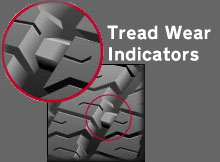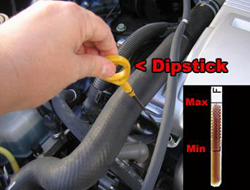All drivers should know the basics of car maintenance. Such knowledge can save you money and help to make your car a safer place to be.
Maintaining Car Tyres
It is vital that you check your car tyres regularly, for wear, cracking, bulging, pressure or objects caught in the tread. Not only are defective tyres highly dangerous but if found by the police to be defective (that is with a tyre tread of less than 1.6mm across the central 3/4 of the tyre or in any other way unroadworthy) you will face a fine of up to £2500 and 3 penalty points per tyre.
Most car tyres have tread wear indicators, usually six small ribs across the bottom of the main tread grooves. When the tread surface becomes level with these ribs the tyre is at the legal limit and must be replaced.

Tyre Pressure:
It is vital that you check tyre pressure only when the tyres are cold, after driving no more than two miles. Warm tyres, achieved by driving no more than a few miles, will provide a false reading.
The correct tyre pressure for your particular car will be listed in the owner's manual and/or on a placard mounted on the car. The correct tyre pressure will relate to the load the car is carrying - the higher the load the higher the pressure.
If you don't own a pressure gauge then the easiest way to check tyre pressure is by using a digital air dispenser found at most petrol stations. These are very easy to use and there should be instructions on how to do so on the machine itself.
Correctly inflated tyres provide the best safety, highest mileage and optimum fuel consumption.
Prolonged under-inflation causes excessive flexing, deterioration of the casing and rapid wear of the tread shoulders. The vehicle will also consume more fuel and will have less grip, and so longer braking distance. There will also be an increased risk of the tyre rupturing.
Over-inflation results in an uncomfortable ride, a reduced area of contact with the road, accelerated wear on the tread centre and makes the tyre more susceptible to impact damage.
Car Tyres Explained What tyres to buy and how to maintain them.
Changing A Flat Tyre
Changing a tyre on a public road can be a very dangerous activity. If you're on a motorway then it is probably wise to phone for assistance. Repairing a car on the hard shoulder is a risky business.
Dealing With A Tyre Blow Out
A blow out is when a tyre bursts whilst you are driving. If ever you find yourself is this situation here's what to do
Checking The Engine Oil

Oil lubricates, cleans and cools your car's engine. If not enough oil is present then the engine is at serious risk of damage. The amount of oil an engine uses depends on:
You should check the engine oil level at least once a fortnight and top up as necessary. Never add too much oil, as this will create excess pressure that could damage the engine seals and gaskets, and cause oil leaks.
To check the engine oil levels:
If the oil does need topping up then you should make sure you use the correct oil, the same as what is already in the engine. Your owner's manual should give you full instructions. If you don't know which specific oil to use then you can use high quality general engine oil such as Castrol.
Oil Changes
At regular intervals it is essential to drain the oil from a car engine and replace it with new, unused oil. This should be done at least once every 10,000 miles, however, check your owner's handbook for the manufacture's recommendations.
As a rule, this is done when the car has its annual service, although it is possible to do-it-yourself. Again, the owner's manual will provide instructions.
Checking The Engine Coolant
Engine coolant helps remove excess heat from your car's engine. It is a mixture of water and anti-freeze. If coolant levels are too low your car's engine can overheat causing the engine serious damage. Check your coolant levels once a fortnight or before a long journey. To do so-
If any of the coolant gets on your skin or on your car's bodywork wash it off immediately. It is poisonous to you and can cause paint damage to your car.
Checking Shock absorbers
To check your car's shock absorbers are in good working order push down on each corner of the car and then release. If the car settles into its normal position after 1-2 bounces then the shock absorbers are in good working order. If it takes longer to settle then it is likely that your shock absorbers are worn out and will need replacing.
Maintaining Brake Fluid Levels
When you press on the brake pedal you are actually pushing against a plunger which forces brake fluid through a series of tubes and hoses to the braking unit at each wheel. So no brake fluid, no brakes.
To check the brake fluid level:
Never allow water to get into the braking system.
Checking Your Brakes
Your car's braking system is complex and should be checked by a professional every 10,000 miles or at least once a year. For non-professionals, the best ways to check your brakes are as follows.
Whilst driving be aware of how the braking system feels. If the brake pedal lacks firmness or goes almost to the floor before engaging, the system should be checked. It could mean that the brake-fluid level has gotten low or is leaking.
Shaking or vibration in the pedal or steering wheel may indicate that rotors are in need of replacement or resurfacing. A squealing sound indicates that the pads are wearing thin.
The sound of grinding or metal-on-metal can be a sign of even more serious problems. Letting that condition continue is likely to ensure that you'll be needing to replace your rotors as well as your brake pads.
To check the handbrake is in good working order - whilst on a incline pull the handbrake on. If it takes more than a few clicks before the car is securely held then the cable or rear callipers/drums need to be checked by a professional mechanic.
FLOWERY Check
The FLOWERY Check acts as an early warning system, and if done correctly, will point out any faults with your car which can lead to it breaking down, or which can put you in danger. Perform the check at least once a week, and before any long journey.